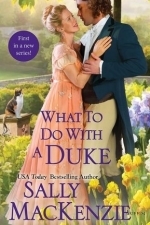What To Do With A Duke
BookThis item doesn’t have any media yet
2015 | Fiction & Poetry
Welcome to the charming, fatefully named village of Loves Bridge, where a woman destined for spinsterhood can live a life of her own choosing—or fall unexpectedly, madly in love…
Miss Isabelle Catherine Hutting would rather be lounging in the library than circling the ballroom in search of a husband any day. So when Cat hears that the town’s infamous Spinster House is open for a new resident, she jumps at the chance to put all this marriage business behind her. But first she must make arrangements with her prospective landlord, Marcus, the Duke of Hart—the most handsome man she’s ever seen, and the only man who’s ever impressed her in the least…
With her wit, independent spirit, and not least of all her beauty, Marcus can’t help but be stirred by Cat. It’s terribly unfortunate he’s not looking to marry, given the centuries-old curse that left his family with the Spinster House to begin with. No duke shall live to see his heir’s birth. But is there a chance the curse could be broken—in true fairy-tale fashion—by an act of true love? The race to Happily Ever After is about to begin…
Related Items:
| Published by | Zebra |
Historical Romance Romance Regency
Main Image Courtesy: Zebra.
Background Image Courtesy: Zebra.
Images And Data Courtesy Of: Zebra.
This content (including text, images, videos and other media) is published and used in accordance
with Fair Use.
| 9-10 |
|
0.0% (0) | |
| 7-8 |
|
0.0% (0) | |
| 5-6 |
|
0.0% (0) | |
| 3-4 |
|
0.0% (0) | |
| 1-2 |
|
100.0% (1) |
